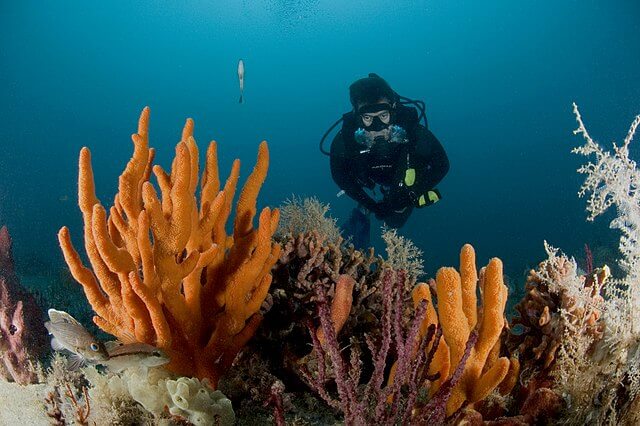
A few years ago, the idea of Reginald Beckford becoming a scuba diving instructor would have been met with laughter, given his long-standing fear of sharks.
However, a transformative encounter with the underwater world led him to not only embrace scuba diving but also play a crucial role in protecting the Turks and Caicos Islands’ third-largest barrier reef from a devastating coral sickness.
In 2019, the Turks and Caicos Islands joined the list of Caribbean countries affected by stony coral tissue loss disease (SCTLD), a lethal ailment that has rapidly spread across 28 nations in the region since its appearance off the coast of Florida nearly a decade ago.
Reginald, along with a dedicated team of reef protectors, is combating the disease that threatens the marine environment and the livelihoods tied to it.
Working as a night watchman on a dive boat, Reginald transitioned from fearing the ocean to actively participating in reef protection.
“The first time I went scuba diving it was surreal, it was like a different world,” he recalls. “Once I saw what we had down there, I wanted to help preserve it in any way I could.”
The archipelago’s once-vibrant reefs, attracting tourists for years, now face the pervasive impact of SCTLD.
Since becoming a dive instructor five years ago, Reginald has trained over 100 students, some of whom have joined the efforts to combat the disease.
The TC Reef Fund, primarily composed of volunteers and reliant on donations, leads these efforts in collaboration with the government’s environment department.
SCTLD affects over 30 coral species, often leading to their demise within weeks of infection. Reginald’s responsibilities include applying an antibiotic paste to sick corals, a method proving successful in halting the disease’s spread and allowing colonies to reproduce.
Reginald’s journey mirrors that of other volunteers like Arenthia Baker, a former teacher turned certified fish data scientist and divemaster. She relocated to the islands during the Covid pandemic, volunteering with the Reef Fund and describing the move as “the best decision I ever made.”
“To be on that side of conservation, you can’t really describe it; it’s such a fulfilling feeling,” she said.
The summer’s unusually warm seas exacerbated the reef’s challenges, causing widespread coral bleaching across the Caribbean. Despite the hurdles, Arenthia remains optimistic about overcoming SCTLD.
“Seeing the bleaching head-on was heart-wrenching,” Arenthia says. “People don’t understand corals are animals, they’re living creatures, and when they’re fighting for their lives because of bleaching they’re more susceptible to disease.”
A significant breakthrough came when researchers discovered the first effective bacterial probiotic for treating the disease, offering hope without promoting antibiotic resistance.
Turks and Caicos stands out in reef restoration research with two in-water coral nurseries and a land-based biobank, a first for the Caribbean’s British territories.
Supported by the John Ellerman Foundation, the biobank preserves genetic diversity by housing healthy coral fragments that will eventually be replanted onto the reef. The team’s innovative approach includes local carpenters crafting tanks as a “coral ark” to hold samples of the most susceptible species.
Preserving coral health involves a complex process of creating synthetic seawater with the ideal mineral balance.
Alizee Zimmermann, the Reef Fund’s executive director, emphasises the importance of maintaining genetic diversity, especially with many coral species succumbing to SCTLD.
“I can walk in and tell if they’re happy or not,” she says. “They show me when they’re hungry too by opening their mouths very wide.”
The corals get much of their food from algae living in their tissues.
“We also feed them conch slop and algae smoothies,” Alizee explains.
As the world focuses on ocean health at the UN climate summit, the hope is that tangible actions will follow.
“The big fear is that this disease is inching its way closer to the Panama Canal,” Alizee, who is part of a coral conservation group for the Caribbean’s UK territories, continues. “There’s a big push to keep it out of the Pacific, which would be disastrous for the world’s reefs.”
Beyond their research and conservation efforts, the Reef Fund’s office doubles as a visitor centre, welcoming hundreds of local schoolchildren.
Alizee aims to inspire future generations by exposing them to conservation work firsthand, fostering a commitment to protecting the oceans.
“I’m really hopeful this project will be successful in its restoration and scientific endeavours,” she adds.
“But I’ve had to become realistic about what that means. Sadly, we will never see the coral reefs that I grew up with look like that again.”
——————————————————————————
At Natural World Fund, we are passionate about stopping the decline in our wildlife.
The decline in our wildlife is shocking and frightening. Without much more support, many of the animals we know and love will continue in their decline towards extinction.
When you help to restore a patch of degraded land through rewilding to forests, meadows, or wetlands, you have a massive impact on the biodiversity at a local level. You give animals a home and food that they otherwise would not have had, and it has a positive snowball effect on the food chain.
We are convinced that this is much better for the UK than growing lots of fast-growing coniferous trees, solely to remove carbon, that don’t actually help our animals to thrive.
This is why we stand for restoring nature in the UK through responsible rewilding. For us, it is the right thing to do. Let’s do what’s right for nature!
Donate today at https://naturalworldfund.com/ and join in the solution!

